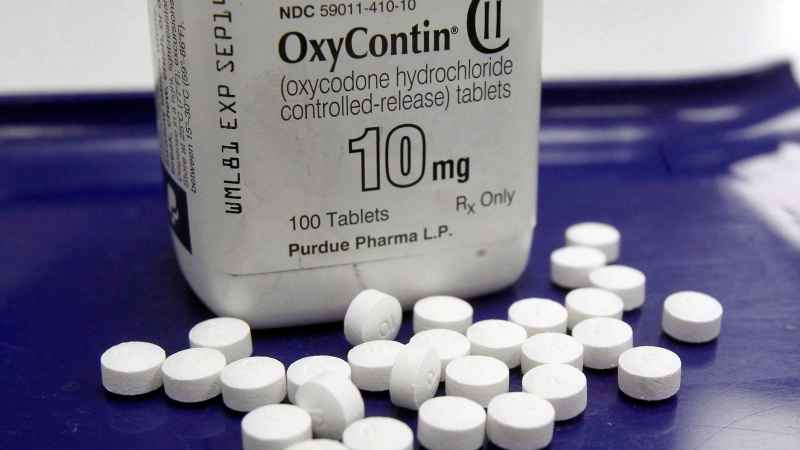

A federal bankruptcy judge on Wednesday conditionally approved a sweeping, potentially $10 billion plan submitted by OxyContin maker Purdue Pharma to settle a mountain of lawsuits over its role in the opioid crisis that has killed a half-million Americans over the past two decades.
Under the settlement reached with creditors including individual victims and thousands of state and local governments, the Sackler family will give up ownership of the company and contribute $4.5 billion but will be freed from any future lawsuits over opioids.
The drugmaker will be reorganized into a new company with a board appointed by public officials and will funnel its profits into government-led efforts to prevent and treat opioid addiction.
Also, the settlement sets up a compensation fund that will pay some victims of drug addiction an expected $3,500 to $48,000 each.
U.S. Bankruptcy Judge Robert Drain said Wednesday he would approve the plan as long as two technical changes were made. He said before his ruling that while he does not have “fondness for the Sacklers or sympathy for them,” collecting money from them through litigation would be complicated.
The settlement comes nearly two years after the Stamford, Connecticut-based company filed for bankruptcy under the weight of some 3,000 lawsuits from states, local governments, Native American tribes, hospitals, unions and other entities. They accuse Purdue Pharma of fueling the crisis by aggressively pushing sales of its best-selling prescription painkiller.
The Sacklers were not given immunity from criminal charges, though there have been no indications they will face any.
THIS IS A BREAKING NEWS UPDATE. AP’s earlier story follows below.
A federal bankruptcy judge prepared to rule Wednesday on whether to accept a settlement between OxyContin maker Purdue Pharma, the states and thousands of local governments over an opioid crisis that has killed a half-million Americans over the last two decades.
If Judge Robert Drain confirms the plan, estimated to be valued at $10 billion, it could cap years of litigation. Members of the Sackler family would give up ownership of the company and pay $4.5 billion while the company is converted to a new entity with its profits being used to fight the epidemic. Objectors could appeal the ruling.
Drain began the hearing in the morning but had yet to rule by early afternoon. He has made rulings that appear to favor accepting the plan, including overruling objections on some insurance issues.
The role of Purdue and the Sacklers in selling a product that caused so much harm, as well as the number of parties involved, “makes the bankruptcy cases before me highly unusual and complex,” he said Wednesday.
The next steps become murkier if the judge sides with a handful of holdout states and activists by rejecting the plan. Parties in the case could head back to the drawing board, and long-paused lawsuits against the company and Sackler family members would likely resume.
The most contentious issue in the settlement process is that Sackler family members would receive protection from lawsuits over opioids. They would not receive immunity from criminal charges, though there are no indications any are forthcoming.
Drain said that while he does not have “fondness for the Sacklers or sympathy for them,” collecting money from them through litigation would be complicated.
The Stamford, Connecticut-based company would become a new entity with its board of directors appointed by government officials. Its profits, along with money from the Sacklers, would be used to fund treatment and education programs, among other efforts, as well as compensate some victims of the crisis. Those who are eligible would be expected to receive payments from $3,500 to $48,000.
Under the settlement, public officials would appoint members of the board of the new company that would replace Purdue.
State and local governments came to support the plan overwhelmingly, though many did so grudgingly, as did groups representing those harmed by prescription opioids.
Nine states, Washington, D.C., Seattle and the U.S. Bankruptcy Trustee, which seeks to protect the nation’s bankruptcy system, opposed the settlement, largely because of the protections granted to the Sackler family.
Drain, based in White Plains, New York, has urged the holdouts to negotiate an agreement, warning that drawn-out litigation would delay getting settlement money to victims and the programs needed to address the epidemic.
“Bitterness over the outcome of this case is completely understandable,” he said Wednesday. “But one also has to look at the process and the issues and risks and rewards and alternatives of continued litigation versus the settlement laid out in the plan.”
He noted that the payout issue was mediated by Kenneth Feinberg, who oversaw the government’s Sept. 11 Victim Compensation Fund.
Opioid-linked deaths in the U.S. continue at a record pace, hitting 70,000 last year.


